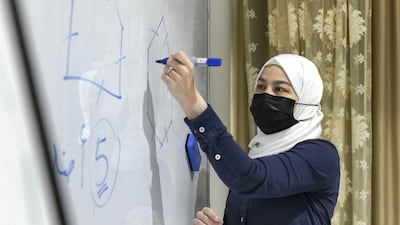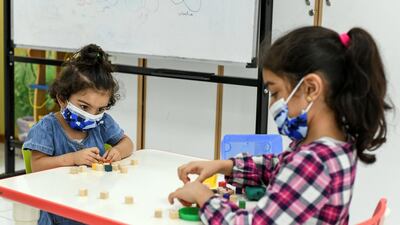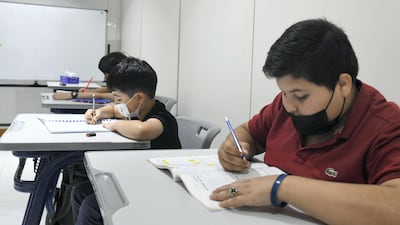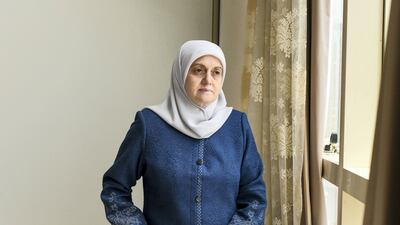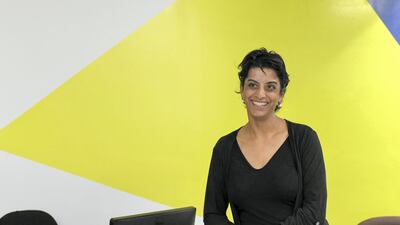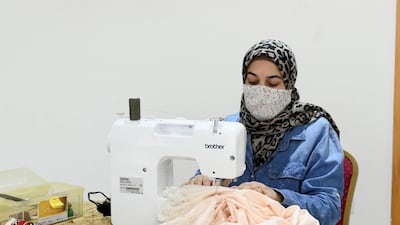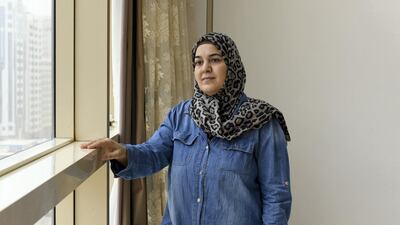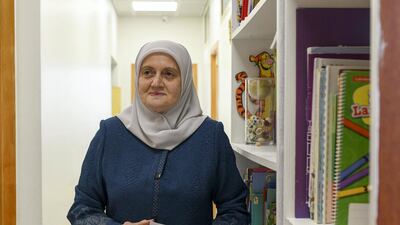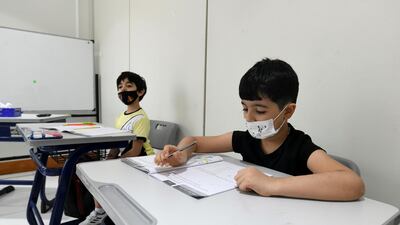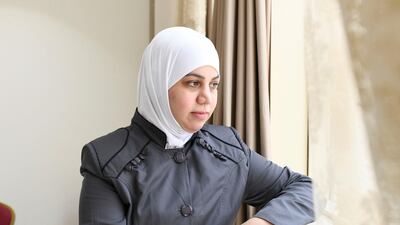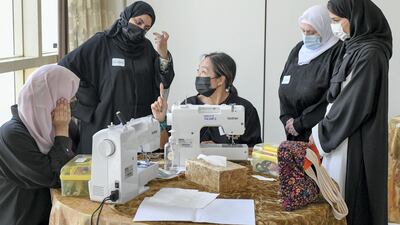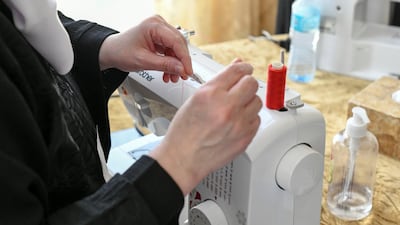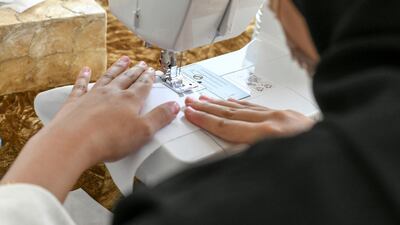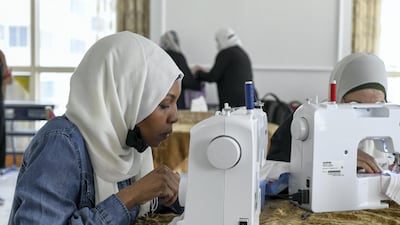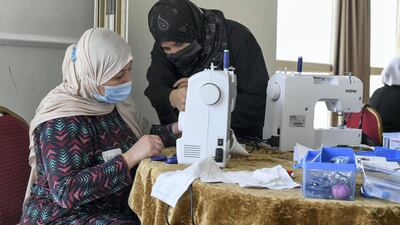A former UN official is on a mission to ensure families in Abu Dhabi who have escaped conflict across the globe are not priced out of an education.
May Kadkoy, who served the United Nations High Commissioner for Refugees for 35 years, was determined to carry on her humanitarian work after retiring from her role in 2017.
A year later, she co-founded Lotus Retal, a centre offering teaching in a wide variety of affordable courses.
The centre launched the Basmet Amal - stamp of hope - initiative in the same year to offer children whose families could not afford tuition fees a free education.
Eighty-five children have since received valuable teaching to ensure they don't fall behind before being able to secure a return to the school system.
About 60 of this number have been able to go back to the classroom, with the help of the centre.
“Our aim is to reach zero cases [of children out of school] and to enrol all pupils back in school,” said Ms Kadkoy, who helped to set up the UNHCR's office in the UAE.
“Our goal was to revive their learning skills and review the material for children who have been out of school for two or three years.”
Ms Kadkoy established the free scheme after noticing a trend for children from low-income Syrian families to drop out of school due to problems affording the fees.
“We started the initiative Basmet Amal to develop the children’s academic skills until they could go back to school,” she said.
Children are taught the Ministry of Education curriculum by volunteer teachers.
Grateful mother eager to give back
Hadeel Al Kadre, who has five children learning at Lotus Retal, became one of the volunteer teachers herself.
“I teach first-graders mathematics,” said the 32-year-old Syrian.
The mother of six children, aged two to 13, moved to Abu Dhabi to escape conflict in her homeland.
She lived in Eastern Ghouta, on the outskirts of Damascus, which was devastated by war.
“Almost 99 per cent of the homes, including our house, were destroyed,” she said.
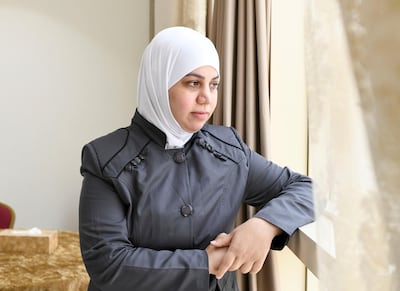
She and her husband, a mechanic, are happy to have laid down roots in the capital but assistance for their children has been welcome.
She was referred to Lotus Retal, becoming first a beneficiary and then a helper.
“My five children are all studying here at Retal. None have been accepted in a school yet,” she said.
Mrs Al Kadre said she has no family members remaining in Syria, with most of her relatives having moved to Turkey.
"My goal is for my children to complete their education,” she said.
Back to school plan
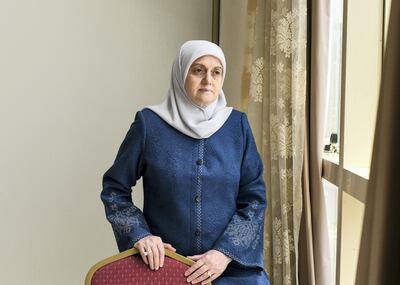
Ms Kadkoy and her team not only provide education, but also work to help learners return to schools.
If free seats at Ministry of Education schools cannot be arranged, the centre will negotiate discounts with private schools.
“We try to find seats in private schools and we negotiate with them to give a discounted fee, and we find them a benefactor to sponsor them,” said Ms Kadkoy.
Another important way to help pupils is to help their parents.
Ms Kadkoy decided to set up another initiative to help mothers of learners develop business acumen, in the hope their newfound skills could provide them with greater financial stability.
“We started a pilot project at the end of 2019, and trained 10 women from conflict-hit countries like Syria, Yemen and Palestine," she said.
“When the project proved its success and the women started selling their products, we approached the UNHCR to sponsor an extensive programme.”
The three-month scheme, which will teach 20 women how to sew and how to market their products and start small businesses, was launched on Tuesday.
“They are being trained by professional coaches who provided similar courses at refugee camps,” said Mrs Kadkoy.
“And the 10 women who trained with us before, are now assisting with the training.”
Training empowers mothers
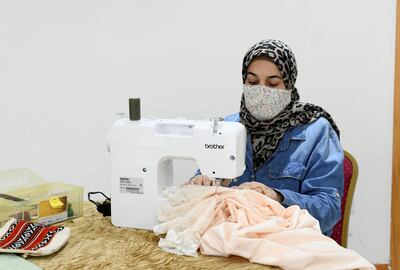
Samaher Al Mohammed was one of the women provided with the sewing skills to help her cover living costs.
“I feel very comfortable with the sewing machine, whenever I come here I feel so much at ease,” said the 32-year-old Syrian.
“I have made 120 masks so far, and I make small purses and beach hats.
“I am happy I learned to do many things here, I started around a year ago.”
Her sales have brought in about Dh1,200 so far.
Ms Al Mohammed moved to the UAE in 2018, one of millions to flee Syria as violence escalated.
“There was a lot of shelling, and our house was struck as well in 2014, and there was nothing left of it," she said.
“It became very difficult to live there, so my husband moved here in 2015, and I followed him here three years later.”
Her husband, who was a bank employee in Syria, now works for a pest control company in Abu Dhabi.
“Our financial situation is quite difficult, and the centre has helped me a lot with the children’s education and teaching me to sew,” she said.
Her children, Jawad, 8, and Jana, 6, have received support from the centre.
She said she always had a passion for sewing, but never learned how to master the craft until now.
“I hope I could get better at it and start a small business.
“And my main goal is for Syria to be safe and secure again. I love my country and I wish to go back.”
